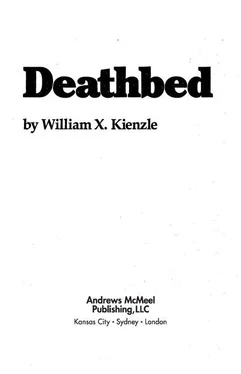“Because”—Dolly shifted her weight; she’d been standing quite a while—“Mr. Haroldson took immediate charge of the investigation. He told everyone you were not feeling well and you were not to be disturbed. But after I thought about it for a while it seemed to me you’d want to know no matter how you felt.”
“I feel fine !” Eileen snapped, though she did not appear well. The unrelenting headache had left her pale and in obvious pain.
“Yes, Sister.”
“On top of it all, the patient might actually have died if Father Koesler had not remembered a conversation wherein she had mentioned her allergy to penicillin.”
“Well, that’s probably true, Sister. Except that the doctors told Mr. Haroldson that they would probably have identified the allergic condition if her symptoms had continued much longer. And Mr. Haroldson says that’s probably true.”
Eileen thought about that for a few moments. “All right, so she probably would not have died. The fact remains, we made her a very sick person.”
Dolly nodded.
“I suppose we ought to prepare for a malpractice suit.”
“I don’t think so, Sister.”
“No?” Eileen was surprised.
“No. It seems Mrs. Power is a very religious woman. According to Father Koesler, she tends to put herself in the hands of God. Father mentioned that she refers to God as ‘Dr. Jesus.’ Anyway, everything that happens to her is fate—”
“Or providence.”
“Yes. So the bad period she just went through—”
“Was God’s will . . . is that it?”
“That’s it.”
“It seems I’ve been getting a lot of ‘good news-bad news’ packages lately.” Her frown intensified. “Whatever else happens, we’ve got to get to the bottom of this. We’ve got to find the responsible party or parties and take appropriate action. This particular calamity seems to have had a relatively happy ending, but there is no doubt it could have been a disaster. We’ve got to find out who’s responsible for this. Dolly, please tell Mr. Haroldson to see me about this at his earliest convenience.”
“Yes, Sister.” Dolly exited.
Eileen continued to massage her temples. Something was wrong; no doubt about that. Never before had she had such a persistent and intense headache. But now was not the time to be sick. So she would not be. She could not be. She had to stay on top of this mess.
Thanks to the remarkable faith of Millie Power, there would be no outside repercussions. But there might have been. There could have been. A malpractice suit could have caused such an increase in their insurance premiums that St. Vincent’s simply could not have afforded it. With no insurance coverage, St. Vincent’s would have been forced, at long last, to close its doors for good and all. And if the unaffordable insurance had not done the job, the media coverage would have accomplished the same.
Cardinal Boyle could be counted on to look the other way as St. Vincent’s fudged on Catholic teaching in order to be relevant to its community. But massive media coverage could not be overlooked. Sister Eileen could not guess how the hierarchy would react to a media exposé of St. Vincent’s. And she didn’t want to find out.
In either eventuality—litigation or publicity—St. Vincent’s seemed the loser.
* * *
Pat Lennon riffled through her notepad. She appeared to be studying the contents. Actually, her attention was some distance from the city room of the Detroit News. She was thinking about St. Vincent’s. She was supposed to be doing a story on St. Vincent’s. But there wasn’t much connection between her notes on St. Vincent’s and her musings about St. Vincent’s.
She had completed all the research needed for the Michigan Magazine article. She had gathered all the background information and done all the interviews. The facts were scattered throughout her notebook. All she had to do was put them together. But rather than collating the material, she was woolgathering.
It was unlike Pat Lennon. She was a professional who could be depended upon. Editors had become used to giving her an assignment and then not having to be concerned about it again. Lennon would bring it in acceptably and on time. While time on a piece for the Sunday magazine was somewhat more leisurely measured than for the regular daily deadline, she was admittedly procrastinating. She had the data. All she had to do was write it up.
But she was distracted by something she could not quite define. Call it a sixth sense, or intuition, or perhaps a hunch. There was some impending danger at St. Vincent’s Hospital. She had felt it during some of her interviews, notably with John Haroldson and Dr. Lee Kim. There was some unrest among certain of the nursing staff. Even Sister Rosamunda seemed to be holding something back. And Lennon had anticipated nothing but the stereotypical sweet little old nun.
Then there was Sister Eileen herself. Somehow she seemed to be the cynosure of the hostility Lennon had uncovered. Pat was also concerned about Eileen’s present state. The crippling headache from which the nun was suffering seemed to make her more vulnerable.
Yet there was nothing Lennon could do about a premonition, or intuition, or a hunch. Staff reporters dealt in facts, events, reality, not in emotional reaction, no matter how strong it might be.
She sighed. Enough of this! Speculation was the purview of columnists and editorialists. She was a pawn in the chess game of journalism. Let’s turn this story out! She switched on the CRT.
“Lennon!” It was Bob Ankenazy.
She looked up and reflexively turned off the word processor.
“All hell’s broken loose at Van’s Can. A full-scale riot! The prisoners have barricaded themselves in the central dining area—the . . . uh . . . Big Top. The riot’s less than half an hour old. We’ve got three people on the scene. We need a rewrite and you’re it! Get on the phone—line three. The story’s coming in right now.”
This, she thought, is more like it. A breaking news story you can sink your teeth into. Nothing speculative or conjectural about this: X-number of prisoners have rioted, X-number of prison guards have been taken hostage, X-number of law enforcement officers will be gathering, armed with everything short of nuclear weapons. There will be X-number of prisoner demands. Eventually, X-number of public officials—mayor, police chief, maybe governor—will assemble.
The first need: Fill in the Xs. Then do a more complete, insightful job of it than either radio or TV, which will reach the public hours before the print medium will be able to tell the story. And, as rewrite, she would quarterback.
For no more than an instant, she thought of Joe Cox. Undoubtedly, he would be covering this for the Free Press. She wondered whether he would be on the scene, where he would want to be, or if he would be, as she was, working from the city room. She had no more luxury than an instant to give to Cox. She put on a headset and activated line three.
“Bill Dunnigan,” the voice identified.
As the story unfolded, Lennon pictured Dunnigan at the scene. Blond, mild-mannered, wearing granny glasses behind which soft blue eyes usually seemed wide with surprise. Dunnigan was the sort of reporter who could be depended on to bring in a careful story faithful to facts. Dunnigan was a professional in the best sense of the term.
“That you, Pat?”
“Uh-huh.”
“Good. What we’ve got here is an insurrection—a riot. Occurred at 12:25 p.m. in the central dining area—the Big Top, as the prisoners call it. That’s upper case B and T. Five guards—all male—have been taken hostage. So far, no one’s been hurt. None of the guards was armed. So the prisoners have no weapons except the tools and kitchen utensils they managed to appropriate. That would include screwdrivers, knives, and saws. Of course, to the hostages these things can be both frightening and threatening.
Читать дальше












